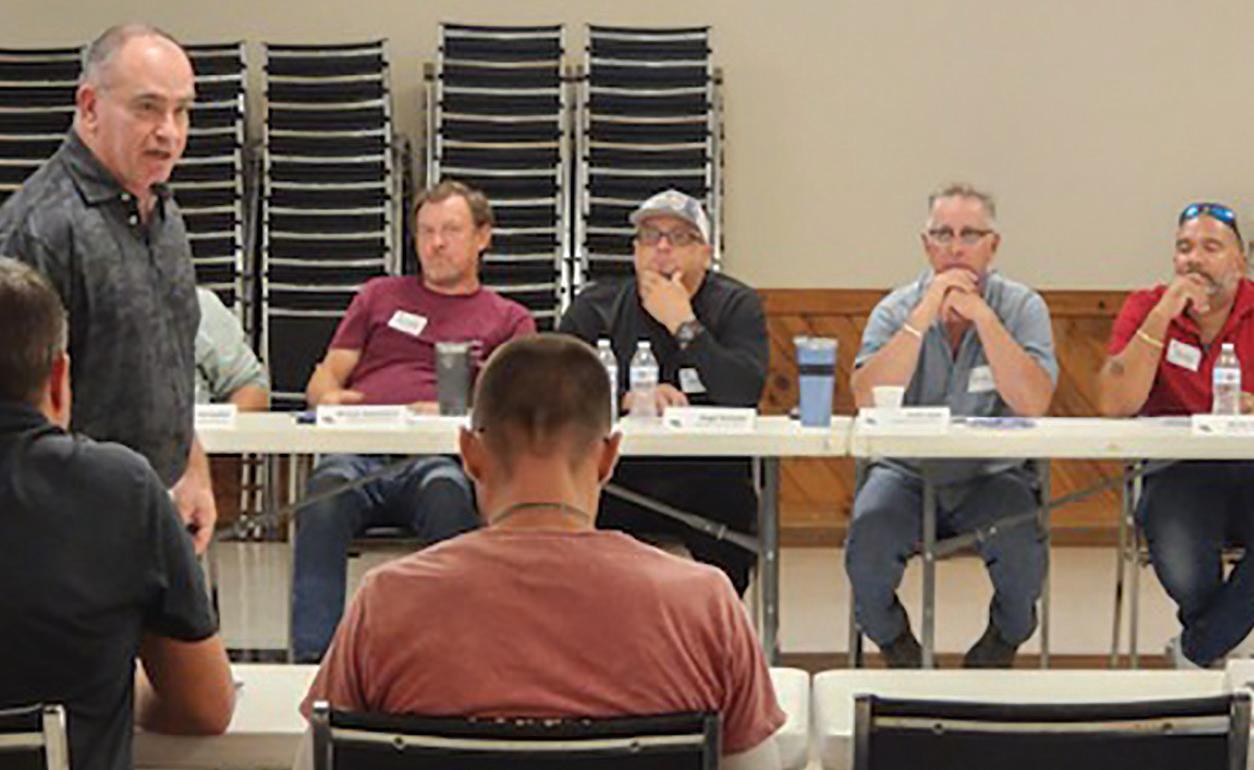
5 minute read
Learning Together Florida SMACNA and Local 32 combine efforts to deliver supervisory training
In late November 2022, Florida SMACNA Chapter Consultant Deborah Wyandt received a call from Rich Applegate, president of Applegate USA/United Sheet Metal Company. He wanted to know whether Florida SMACNA could arrange a training program for supervisors and forepersons before the end of the year. Wyandt was unsure. The feasibility of coordinating a program in a relatively short time frame so close to major holidays seemed flawed. Applegate explained, however, that work was going to be slow for the remainder of 2022, which made it a good time—the only time, really—to take forepersons and other supervisors away from their jobsites or the shop. Once the company got into 2023, work would pick up and the window for training would close.
SMACNA National’s education department was quick in approving funding for a supervisory training program and, fortunately, Kevin Dougherty, one of the industry’s most popular speakers on the topic, resides in Florida. Preliminary plans started coming together.
The remaining challenge was finding a hotel or other location with meeting space to hold a training program for nearly 30 attendees so close to Christmas and Hanukkah. One brief call from Applegate to Danny Villarruel, Local 23 business manager, resolved that challenge. Villarruel offered the union hall for the training.
“When Deb Wyandt and Rich Applegate contacted me regarding the training for supervisors and forepersons, I agreed to help in any way possible,” he says. “We all can learn from one another, and seeing things from a different perspective makes us better people, employees, and owners.”
But Local 32 representatives didn’t just provide a meeting room. They set up the room and all audio-visual requirements, supplied breakfast and coffee, recommended caterers, helped with the lunch, and cleaned the meeting room when attendees departed.
“Two Local 32 representatives attended the entire program, which demonstrated to their members that the union supports training and knows the value of having the best trained supervision in the industry,” Wyandt says. “This level of collaboration came as no surprise. Florida has the toughest non-union competition in the industry. Labor and management must work together as partners to compete in such a tough market.”
Topics covered during the day-long program included
How to be a leader, rather than a boss,
How to be a better listener,
Time management tactics,
Motivation for maximum performance,
Dealing with difficult people,
Minimizing conflict and personality clashes,
How to adjust communication skills to deal with different workers,
Results-oriented problem-solving, and
How to manage amid changing worker demographics.
All of those topics were chosen to help industry forepersons to more effectively motivate and communicate with their teams and enhance their ability to train future supervisors. Resulting increases in employee retention and productivity will benefit both labor and management in the long run.
Attendee feedback was overwhelmingly positive. They complimented Dougherty’s knowledge of the industry and the lively and interactive nature of his presentation. Numerous attendees suggested they would like more training to enhance their supervisory skills.

Applegate likewise wished they had more time to devote to this important training. “The supervisory training was extremely helpful and very beneficial to our company,” Applegate says. “Applegate USA/United Sheet Metal has many young forepersons and supervisors running multimillion-dollar projects, and the continued training is critical as we move into the future.”
Participants commented on how the training can be applied to various day-to-day jobsite scenarios. “Kevin did a great job with putting various supervisors in difficult situations that included employee problems, GC problems, and others, and then going through ways to handle the situation to a successful outcome,” Applegate says.

Villarruel noted many teachable moments as participants were able to step-out of their comfort zones and realize the common humanity among the group.
“We are all human and make mistakes, but when you learn from each other—the workforce from supervisors and vice versa—that is when you grow as a person and as a leader and employee,” he says. “It also makes one and all accountable for what they learned during the training so that they can bring it out on the jobsites as we continue working together for a better future for our contractors and members.”
Villarruel is supportive of future training with the Local’s SMACNA partners. “As we continue working together for a better future for our contractors and members, the more we can and should learn together,” he says. ▪
SMACNA National allocates funding each year to conduct a number of supervisory training programs at the local level. SMACNA National lines up the speakers on a variety of topics and covers speaker fees for approved programs. Chapters are responsible for speaker travel costs, meeting room rentals (if necessary), and meals and refreshments for attendees.
A list of supervisory training programs is available on SMACNA’s website under Chapter Supervisory Training Programs. SMACNA Chapter Executives interested in scheduling a program may contact Bridgette Bienacker (bbienacker@smacna.org) or Shelly Dixon (sdixon@smacna.org) for more information.










